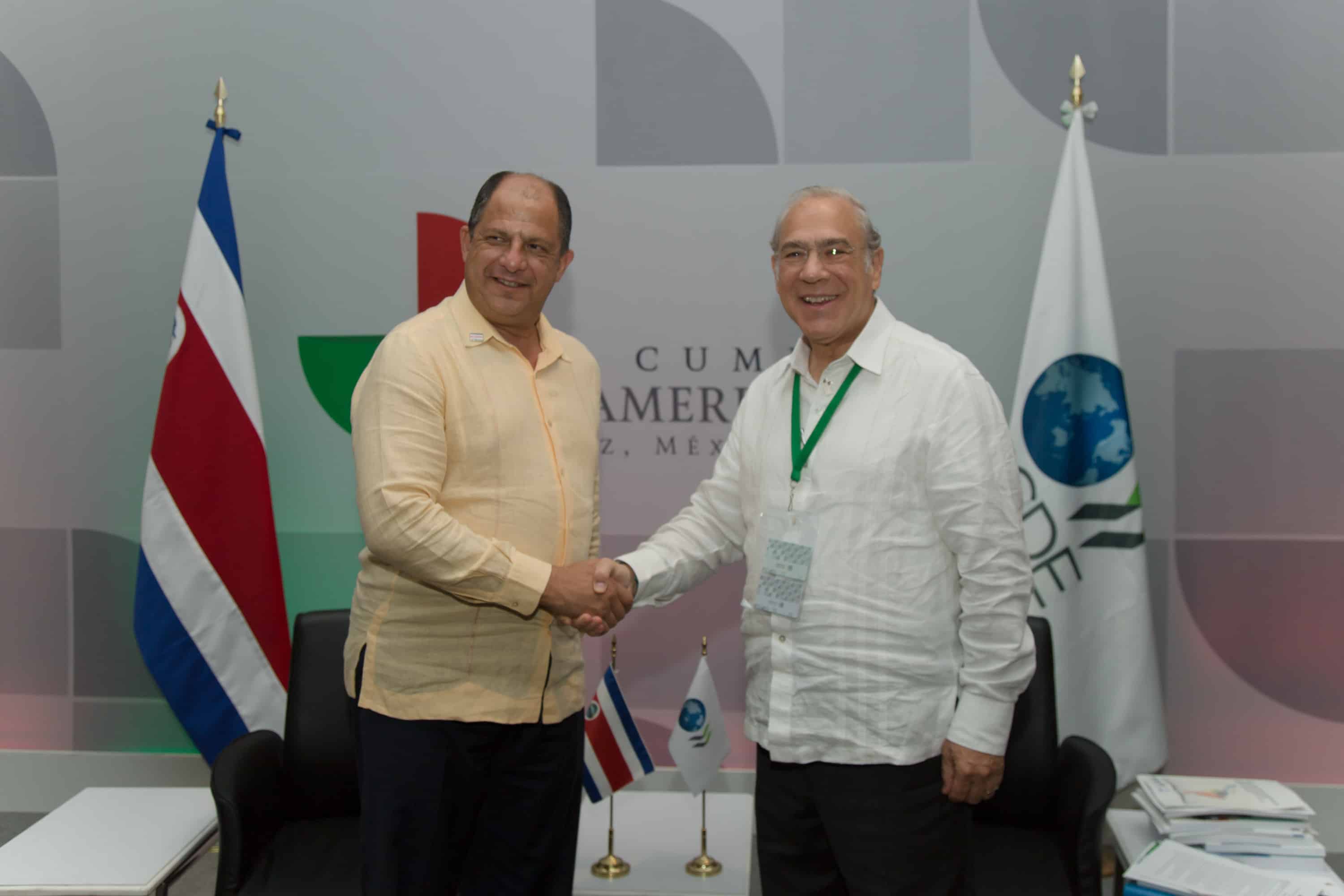The Organisation for Economic Co-operation and Development formally invited Costa Rica to apply as a candidate for membership this week, five years after it began its push to join the exclusive club of developed economies.
The news of Costa Rica taking one more step closer to joining the league of developed economies came shortly after President Luis Guillermo Solís said he would lobby U.S. President Barack Obama for some of the $1 billion in proposed aid designated for Guatemala, Honduras and El Salvador — countries that lag far behind Costa Rica in many social and economic indicators — during the Summit of the Americas in Panama Friday.
Costa Rica’s economy is far smaller than many OECD nations and still relies on larger partners, like the United States, for security and development assistance. But the country’s long record of universal education and socialized healthcare has put it on par with many OECD nations in terms of social indicators, as seen in the 2015 Social Progress Index released Thursday.
The Social Progress Index looks beyond gross domestic product when ranking nations, taking into consideration how well citizens social and environmental needs are met.
The contradiction begs the question: Can Costa Rica present itself as an advanced, or at least, soon-to-be developed economy, while also keeping one hand out for foreign aid? Some analysts say yes.
“It’s a tricky argument but one that is not so unusual for developing countries,” Latin America expert Michael Shifter wrote in an email. Shifter is president of the Washington D.C.-based Inter-American Dialogue, a thinktank.
Costa Rican leaders were nothing but positive about joining the OECD. President Solís said the OECD application “marks a milestone in our development.”
“It’s a decision that supports our aspirations to spark growth with a solid base of best practices, transparency and high standards of management that this administration has proposed,” he said in a statement.
Casa Presidencial said that OECD membership would help improve public policies here as well as further sustainable development goals and grant Costa Rica a place at the table during global negotiations about climate change and financial transparency.
The OECD is a club of 34 developed economies, mostly in Europe and North America, that works to improve governance and economic growth along with topical concerns like the environment and corruption. The OECD countries account for 70 percent of the global market, according to Costa Rica’s Foreign Trade Ministry.
OECD Secretary-General Angel Gurría also issued a statement Thursday, welcoming Costa Rica’s and Lithuania’s applications for the club.
“The opening of accession talks with Costa Rica and Lithuania and the interest by these two countries in joining our Organisation highlights the OECD’s growing role as the place where countries go to find answers to common economic challenges. Both Costa Rica and Lithuania come well prepared,” he said.
In Latin America, Colombia is in the process of applying to the OECD, and Mexico and Chile are already members.
Foreign Trade Minister Alexander Mora said that joining the OECD would “open great opportunities” for Costa Rica.
But the payoff from eventual membership remains vague.
“I think there’s been some hype about what joining the OECD will mean for Costa Rica,” Juan Carlos Hidalgo, a Latin America political analyst at the Cato Institute, observed.
“Joining the OECD means you get a little gold star on your forehead,” Hidalgo said. “You get to boast that you belong to a club of mostly well-run countries. But that’s pretty much it.”
Membership does not make any guarantees when it comes to trade access or investment, he said, and it does not mean that Costa Rica becomes a developed economy overnight.
“It’s better to be inside the OECD than outside,” Hidalgo said, “but it’s not like we suddenly reached development status.”
Costa Rica might not be a full-fledged developed economy but the country’s human wellness index is better than many OECD members. According to the Social Progress Index, Costa Rica, which ranked 26th in the world, outscored OECD member states Italy (31), Hungary (32), Greece (34) and Mexico (54).
The armyless Central American country’s long history of redirecting resources that would have gone to its military into education and healthcare has helped it develop one of the best human resource talent pools in the isthmus.
Shifter, from the Inter-American Dialogue, said that membership in the OECD would give the country a leg up in terms of its global economic strategy. The prestige that comes with OECD membership grants the country greater name recognition and shows that Costa Rica adheres to international best practices, he said.
He said he saw no contradiction in joining the OECD while still receiving U.S. aid.
Costa Rica began its application to join the OECD in 2010 under President Laura Chinchilla (2010-2014). The Legislative Assembly now must approve the application protocol.






